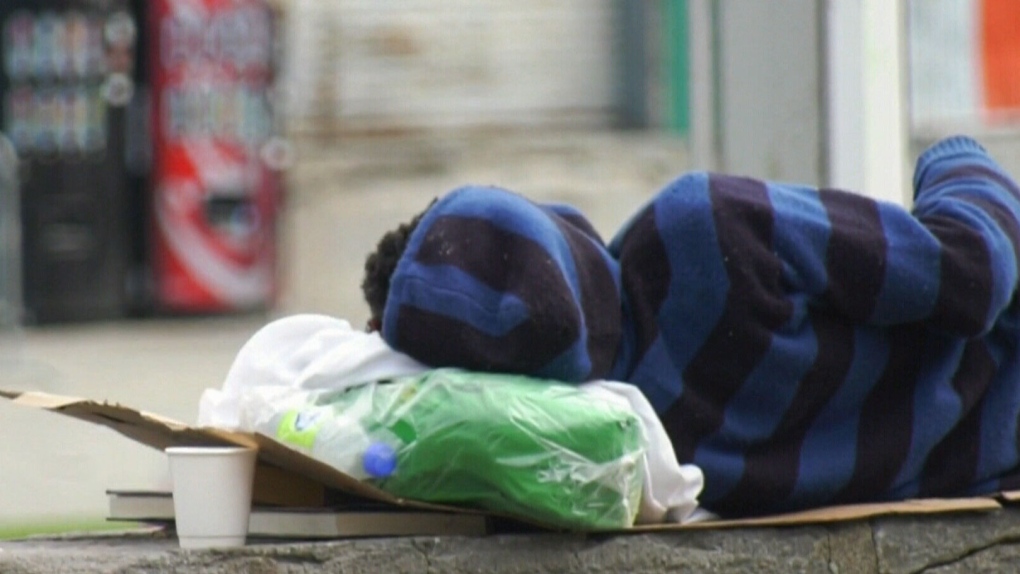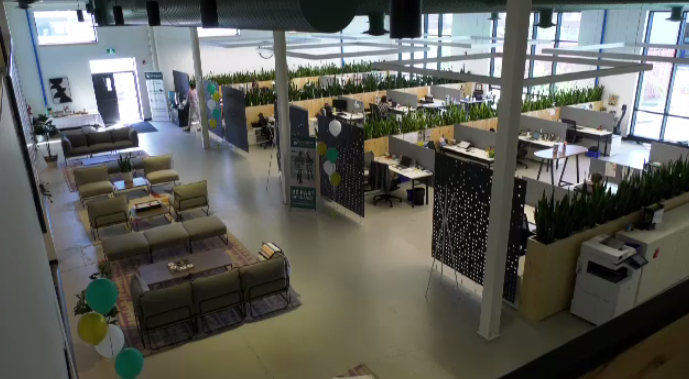The ways you can help someone on the street experiencing a mental health crisis

It’s an increasingly common scene in Winnipeg: an unsheltered person showing clear signs of a mental health crisis, acting erratically, ranting and yelling, lashing out at objects and people around them, and possibly hurting themselves and others in the process.
This unsettling scenario is being seen frequently in the downtown core, on the bus, and in other parts of Winnipeg. And it's a crisis facing the city's marginalized population according to Sharon Blady, founder and CEO of Speak Up Mental Health & Neurodiversity.
"These folks fell a long time ago, and the safety nets did not catch them," Blady said. "There can be disassociation, there can be psychosis going on."
She said the behaviour of people on the streets experiencing a mental health crisis is often dismissed as being caused by drugs, "but even if they are using a substance, it usually comes from some form of self-medication," said Blady.
"They are either trying to bring down a feeling that they are feeling too intensely, or trying to feel something where there's a numbness … its self-medication and it has these other consequences," she added.
Blady said the stigma of homelessness still contributes to the problem.
"There are still strong stigmas against the populations who are under-housed, under-supported in terms of their mental health and neuro-divergence," she said.
It’s an issue faced every day by Turning Leaf Support Services, a non-profit organization that seeks to help those living with mental illness.
CEO Barkley Engel said in his experience, substance addiction and mental health problems go hand-in-hand. "Sometimes they're exacerbated by self-medication, other times they are a way that they can manage the intense pain of the trauma that they’ve experienced," he said.
Among its other mental health support services, Turning Leaf runs an after-hours crisis response unit created to de-escalate these exact situations.
"Last year for sure we've seen an increase in calls for our after-hours team," said Engel. "Most of them pertain to self-medication or addictions; specifically there are overdoses that we're managing at that level."
He said the crisis team is dispatched from a central location and can respond anywhere in the city when people call to report an incident.
Engel said the team carefully assesses the situation when they arrive. "When we're on scene, there's a lot of listening, a lot of scene assessment – what's happening, what is this person presenting with … you cannot rush a moment of crisis intervention."
He referred to a recent incident in which a woman who was overdosing came to their Roseberry Street location for help.
"We're glad she came by the office, she definitely needed the help," said Engel. "But that particular intervention - from start to finish - took six hours. So you have to be prepared to spend time," he said.
 Turning Leaf Support Service's new Roseberry Street space has private rooms for counselling, a kitchen area for people to eat and washrooms with showers for vulnerable people to wash up.
Turning Leaf Support Service's new Roseberry Street space has private rooms for counselling, a kitchen area for people to eat and washrooms with showers for vulnerable people to wash up.
The crisis response team is available only for Turning Leaf clients, and is not meant for the general public.
Manitoba Shared Health does runs a publicly-accessible crisis response centre. Anyone can call the Mobile Crisis Service at 204-940-1781 for help. But a Shared Health spokesperson still recommends calling 911 first if you think there is an immediate danger.
"The immediate action recommended in situations where someone is harming themselves, is experiencing a medical emergency or is posing a danger to themselves or others is to call 9-1-1 and ask for help," said Shared Health in an email to CTV News. "If you feel it is unsafe to approach the individual then do not approach them. Maintain a safe distance and, if possible (and if safe), stay until emergency help arrives."
Engel said the demand for Turning Leaf's services has grown exponentially since the pandemic began.
"There was a bit of a slump at first, and then we saw a pretty significant escalation in reports of the use of substances and mental health crisis," he said.
"The isolation and the lack of access to service because of COVID exacerbated the situation and brought those particular cases to our front door," Engel added.
Blady agrees the pandemic made things worse, as the increased demand on the health-care industry took its toll on Winnipeg's unsheltered population.
"Those things were amped up exponentially while services went down … all of our health care systems were strained," she said.
Blady said anyone trying to help someone in mental health crisis should be cautious. "If somebody's having a psychotic episode, how you approach them or if you approach them can make a difference because they may lash out."
She said one thing you can do in that moment is to scan the environment and see who else is there.
"You could be in a situation where other people are behaving in ways in response to them that may either be aggressive, demeaning, shameful, something else that could be accelerating things," said Blady.
She said it's important to be accepting in that situation. "Nobody's there by choice. We need to lead with empathy, compassion, non-judgment."
Engel said his team has done a good job of filling the gap between medical treatment and law enforcement. "Once we get involved, the risk decreases, they are de-escalated, they don’t require law enforcement engagement."
He said in many cases an ambulance does not need to be called, which saves on resources.
Blady said reducing the number of uniforms involved can help.
"A lot of folks that are in these places have had negative experiences with first responders," Blady said.
She said the focus needs to be put on prevention and helping these people get off the streets.
"What it might cost to house somebody is far less than what it costs if they end up making repeated visits to emergency departments, and there are ambulances being called, and all the other things that we are doing," said Blady.
Engel said it is about removing barriers. "I think the best thing that we do is that we're responsive, so regardless of the time and place, the service that we've got is designed to respond. And that’s a huge part of engaging people that are in crisis.
"They need some resources to access for sure, and calling 311 or 911 is a limited response," said Engel.
He said Turning Leaf has made rubber bracelets for their clients to wear with the appropriate emergency numbers printed on them. "They can show someone to call the number that’s on there, and we can respond."
Engel reinforces that the most important thing to do in that situation is to be understanding. "This is where they're at today, meeting them where they're at and being accepting. That’s our byline at Turning Leaf, unconditional acceptance."
CTVNews.ca Top Stories

Tensions flare between Poilievre and Singh in the House after NDP says it will back Trudeau Liberals
Conservative Leader Pierre Poilievre and NDP Leader Jagmeet Singh got into a heated exchange in the House of Commons on Thursday, just minutes after Singh announced his party would not be supporting the Conservatives' first non-confidence motion against Prime Minister Justin Trudeau's government.
'It's disgusting': Quebec minister reacts after body of boy, 14, found near Hells Angels hideout
The province's public security minister said he was "shocked" Thursday amid reports that a body believed to be that of a 14-year-old boy was found this week near a Hells Angels hideout near Quebec City.
Missing six-year-old boy disappeared after school breakfast program: Manitoba RCMP
Shamattawa RCMP are searching for a missing six-year-old boy who hasn’t been seen since Wednesday morning.
Woman dead, toddler uninjured following B.C. police shooting, watchdog says
B.C.'s police watchdog is investigating the death of a woman who was shot by the RCMP after allegedly barricading herself in a room with a toddler early Thursday morning.
PM Trudeau names Anita Anand transport minister after Pablo Rodriguez quits cabinet
Prime Minister Justin Trudeau tapped Treasury Board President Anita Anand to take on additional duties as Canada's minister of transport on Thursday.
Canadian women among those who allege Harrods boss sexually abused them
CTV News has learned there are multiple Canadian women alleging they were victims of sexual abuse at the hands of the late Harrods boss Mohamed Al Fayed.
The Royal Canadian Mounted Police has lost 205 firearms since 2020, including machine-guns
The Royal Canadian Mounted Police has lost 205 firearms since 2020, including more than 120 handguns and at least five fully automatic weapons like machine-guns.
Shohei Ohtani becomes the first major league player with 50 homers, 50 stolen bases in a season
Shohei Ohtani became the first major league player to hit 50 home runs and steal 50 bases in a season, with the Los Angeles Dodgers star going deep twice to reach the half-century mark and swiping two bags to get to 51 against the Miami Marlins on Thursday.
Francois Legault wants the Trudeau government to fall
Quebec Premier Francois Legault is calling on the Bloc Quebecois to topple the Trudeau government next Wednesday and trigger a federal election.


































